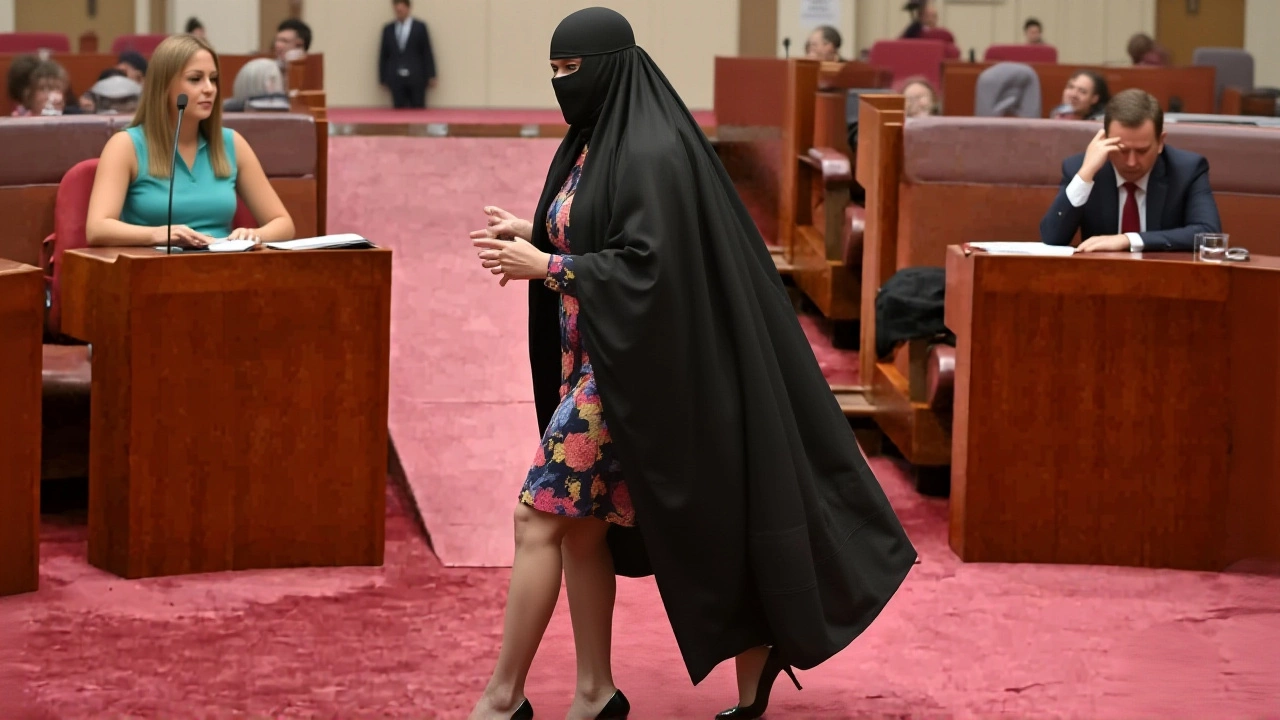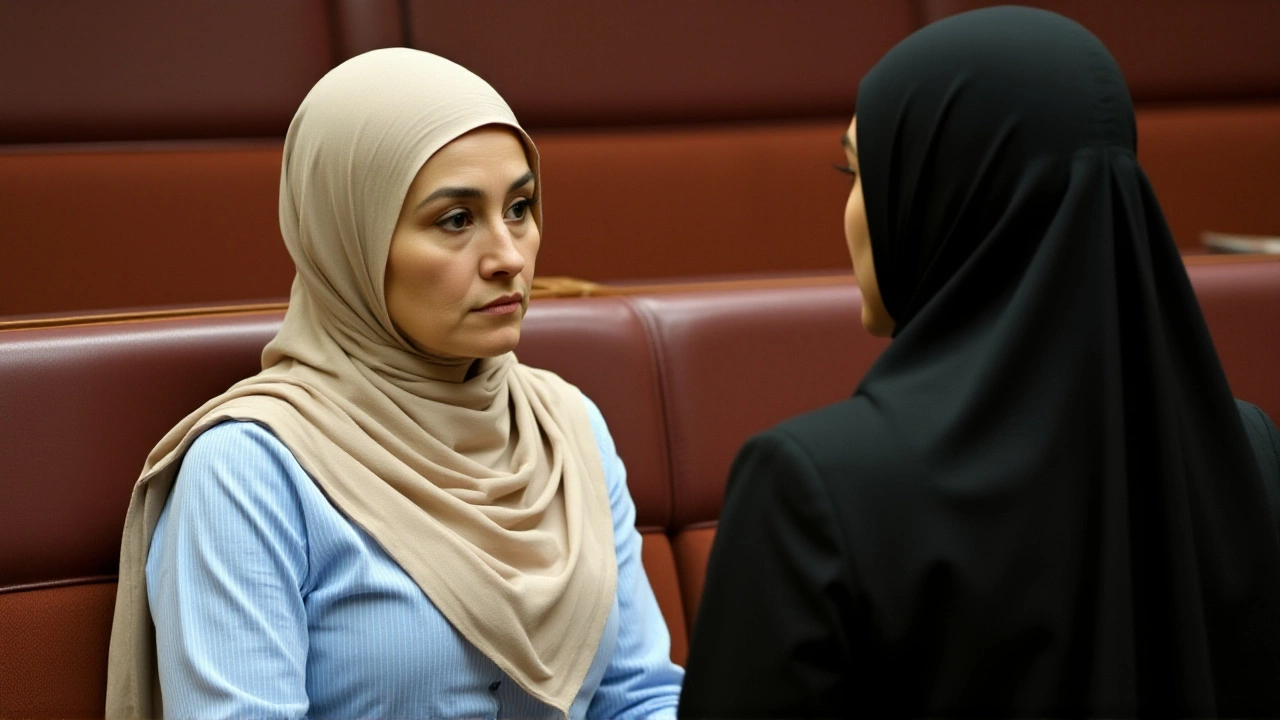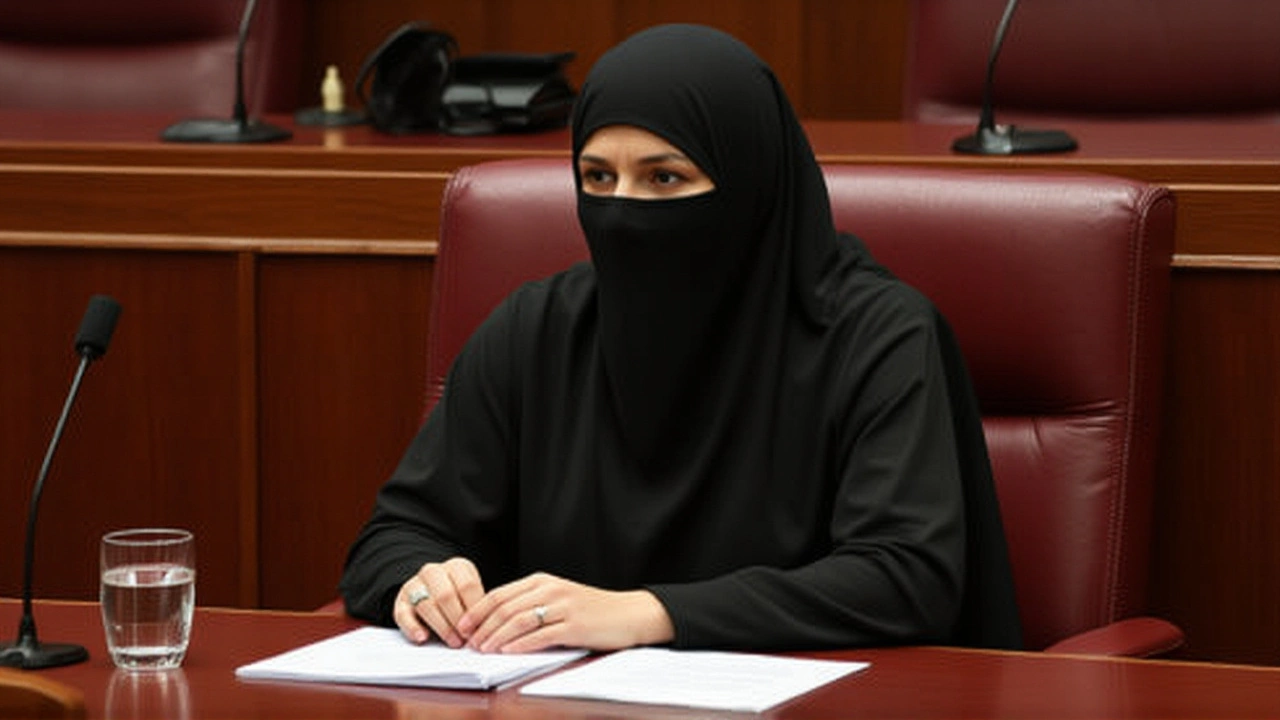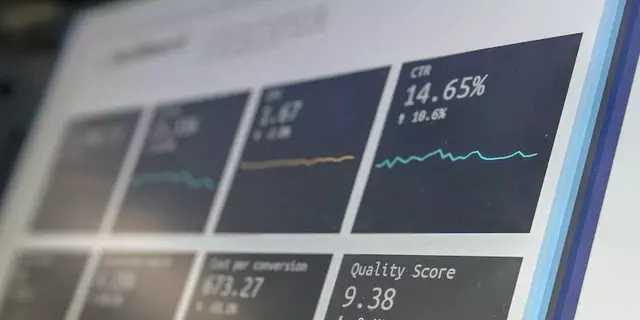On Monday, November 24, 2024, Pauline Lee Hanson, the 71-year-old leader of Pauline Hanson's One Nation, walked into the Australian Senate chamber fully veiled in a burqa — not as a follower of Islam, but as a political statement. The act, meant to protest a proposed ban on full-face coverings, triggered an unprecedented response: a formal suspension from Parliament for the rest of the year. The move, passed on Tuesday, November 26, 2024, marks the first time in Australian parliamentary history that a senator has been disciplined for wearing religious attire as a form of protest. It wasn’t just about clothing. It was about identity, respect, and the fragile line between free speech and hate speech in a multicultural democracy.
What Happened in the Senate Chamber?
That morning, as senators prepared for routine business, Hanson entered the chamber draped head to toe in a traditional Muslim garment, her face obscured. No one expected it. Not even her allies. Senator Fatima Payman, who wears a hijab as part of her faith, immediately rose, visibly shaken. "This is disgraceful," she said. "She’s using a prop — and it’s a dangerous one." Payman, one of Australia’s few Muslim parliamentarians, didn’t speak during the formal censure debate, but her quiet outrage spoke volumes.
By afternoon, Penny Wong, Australia’s Government Leader in the Senate and the nation’s first female Foreign Minister, stood to move a censure motion. Wong, born in Malaysia and raised in Adelaide, didn’t mince words. "This isn’t protest. It’s mockery," she said. "It mocks nearly one million Muslim Australians who live quietly, contribute to our schools, our hospitals, our neighborhoods. And it makes us weaker." The chamber fell silent. Then, one by one, senators from across the aisle voted. The motion passed 41 to 12. Hanson was suspended until December 31, 2024 — barred from speaking, voting, or even entering the parliamentary precincts.
A Pattern of Provocation
This wasn’t Hanson’s first time. In 2017, she wore the same garment during Senate proceedings — and walked away with nothing more than a few media headlines and a shrug from leadership. Back then, the response was muted. Critics called it offensive, but no institutional action followed. What changed? The political climate. The rise of far-right rhetoric. The growing visibility of Muslim Australians. And perhaps, most importantly, the fact that this time, the outrage wasn’t confined to social media. It spilled into the Senate floor — and it stuck.
Hanson’s history of inflammatory acts runs deep. In 2023, an Australian court found her guilty of breaching the Racial Discrimination Act after she posted a video telling fellow senator Mehreen Faruqi — a Pakistani-born Muslim woman — to "return to your homeland." That ruling, though not criminal, carried a public reprimand and cost her credibility among moderate voters. Still, she doubled down. In early November 2024, she traveled to Florida to speak at the Conservative Political Action Conference, where she called Islam "a threat to Western values." Back home, her party’s support had dipped to 3% in national polls. The burqa stunt? Many saw it as a last-ditch bid for attention.

Why This Matters Beyond the Chamber
The suspension isn’t just about one senator’s behavior. It’s about what Australia says — and doesn’t say — about inclusion. With over 28 million people and nearly one million Muslims, Australia is one of the most culturally diverse nations on Earth. Yet, as Hanson’s actions show, that diversity is often met with performative hostility. The burqa, worn by a tiny fraction of Muslim women here, became a political weapon. And in doing so, it turned a personal religious practice into a national flashpoint.
"It’s not about the garment," said Dr. Amina Hassan, a sociologist at the University of Melbourne. "It’s about who gets to define what’s acceptable in public life. When a senator uses a religious symbol to ridicule its adherents, it signals that minorities are not fully part of the national story. That’s dangerous."
Even some of Hanson’s own supporters admitted it went too far. "I agree with her on immigration," said one Queensland voter in a post-Senate interview. "But this? This wasn’t politics. It was theater. And theater like that just feeds hate."

What Comes Next?
Hanson’s suspension ends on December 31, 2024. But her political future remains uncertain. Her party, Pauline Hanson's One Nation, has already begun internal discussions about leadership succession. Meanwhile, the Senate is considering new rules to prevent similar disruptions — including potential bans on wearing clothing that could be interpreted as mocking religious or cultural symbols during proceedings.
For Muslim Australians, the moment was both painful and empowering. "For the first time," said Faruqi in a private statement, "the Senate didn’t just ignore the hurt. It acknowledged it. That matters."
And for the rest of us? It’s a reminder that democracy doesn’t survive on noise alone. It needs boundaries. Respect. And the courage to say: some things are not up for debate.
Frequently Asked Questions
Why was wearing a burqa in Parliament considered offensive?
The burqa is a religious garment worn by some Muslim women as an act of faith. When Senator Hanson wore it as a protest, she used it not as a symbol of belief, but as a tool to ridicule the very community that observes it. Muslim Australians, including Senator Fatima Payman, said it felt like a mockery — turning a personal choice into a political punchline. The Senate viewed it as an act of vilification, not free expression.
How is this different from the 2017 incident?
In 2017, Hanson wore the burqa and faced no formal consequences, despite widespread criticism. In 2024, the political landscape had shifted. Muslim representation in Parliament had grown. Public awareness of Islamophobia had increased. And Senator Penny Wong, as Government Leader, pushed for accountability. The difference wasn’t the act — it was the response. This time, the institution chose to draw a line.
Does this violate Pauline Hanson’s freedom of speech?
No. Australia’s Parliament has long had rules governing conduct within its chambers. Freedom of speech doesn’t extend to actions that deliberately insult or demean protected groups during official proceedings. The suspension was for disruptive and disrespectful behavior — not for her opinions. Similar rules apply to shouting, wearing offensive symbols, or blocking votes. This was about decorum, not censorship.
What impact does this have on Muslim Australians?
For many, it was a rare moment of institutional validation. When a senator is suspended for mocking their faith, it sends a message: your identity matters. Community leaders reported a surge in public support and donations to Muslim youth programs following the vote. But it also deepened fears. One mother in Sydney told the ABC: "I told my daughter today that we’re safe here. But now I’m not so sure." The impact is emotional as much as political.
Could this lead to a national ban on burqas?
Unlikely. Hanson’s proposed ban has never gained traction in Parliament. Only 1% of Muslim women in Australia wear the burqa, and no major party supports a nationwide ban. The 2024 incident actually weakened her position. Polls show 68% of Australians oppose banning religious clothing in public. The Senate’s response — punishing the provocation, not the belief — suggests the country is moving away from such legislation, not toward it.
What’s the significance of Penny Wong leading the censure?
Wong, a Malaysian-born woman who rose to become Australia’s top diplomat, represents the very diversity Hanson claims to oppose. Her leadership in this moment wasn’t just political — it was symbolic. She didn’t speak as a Muslim, but as a guardian of Australia’s democratic norms. Her presence at the center of the response showed that standing up to hate doesn’t require shared identity — only shared values.




